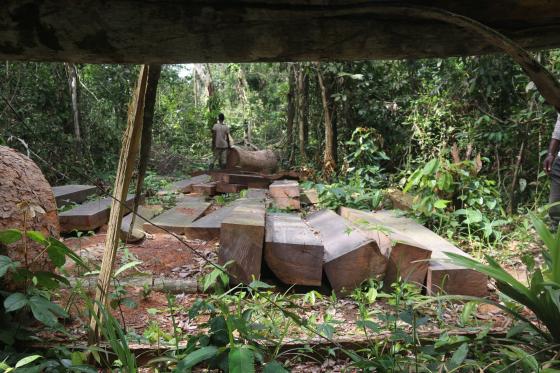Liberia: FDA Says It Issued ‘Tens’ Of Permits Outside Legal System

Top: Illegal timber production has increased in recent years amid the FDA’s issuance of permits outside the legal system. The DayLight/James Harding Giahyue
....The rise of illegal activities has not gone unnoticed by the outside world. Recently, the Associated Press reported Liberia may possess a “parallel” system for the export of illegal timbers.
The Forestry Development Authority said it has issued “tens” of export permits outside Liberia’s log-tracking system.
“Tens of these documents have been issued to businesses that have expressed intent to get involved in trading timber and non-timber forest products in Liberia,” said Edward Kamara, the FDA’s manager for forest product marketing and revenue forecast.
The DayLight has requested access to all of the permits, a right guaranteed forestry legal frameworks, the Liberian Constitution and the Freedom of Information Act. Kamara was replying to email queries from The DayLight on one of the permits. The DayLight had addressed the email to Managing Director Mike Doryen, copying senior managers.
The FDA issued the permits Kamara referenced outside the chain of custody system or LiberTrace. By law, the FDA must issue all permits within LiberTrace.
“No person shall import, transport, process, or export unless the timber is accurately enrolled in the chain of custody,” according to the National Forestry Reform Law.
A pivotal part of Liberia’s international timber trade, LiberTrace traces the sources of the logs to their final destinations. The computerized system checks the legality of timber, including contracts, transports and payments. LiberTrace’s permits contain barcodes, and companies acquire them on a shipment-by-shipment basis.
Edward Kamara, FDA’s manager for forest product marketing and revenue forecast, is an architect of export permits awarded outside Liberia’s log-tracking system, whose funds are not remitted into the coffers of the government. The DayLight/James Harding Giahyue
From the ones published so far, the permits warn their holders to trade only timber from legal sources. William Pewu, the technical manager for the FDA’s commercial department, argued that the caveat was sufficient to deter any wrongdoing.
“This means a permit holder of such a category is acquiring forest products from companies already captured within the chain of custody (CoC) system and by extension LiberTrace.”
But the strategy has not worked. Holders of the documents have engaged in illegal logging activities, particularly in the last three years. The most infamous is the production of squared timber called “kpokolo.” Last month, Kamara said the FDA had banned kpokolo. However, it is yet to officially publish the ban.
The rise of illegal activities has not gone unnoticed by the outside world. Recently, the Associated Press reported Liberia may possess a “parallel” system for the export of illegal timbers. Citing diplomatic sources, the report said officials, including from the FDA, were colluding with illegal loggers to ship stolen timbers. It referenced a letter signed by Doryen permitting a shipment outside the legal system. A previous report quoted an international investigation that blamed the FDA for Liberia’s forestry violations.
This receipt shows Emmanuel Gongor of Tropical Wood Group of Investment paid the FDA US$226 to transport 113 pieces of kpokolo, also called block wood, on May 11, 2022. No records show the fees were paid into the government’s official coffers as mandated by law. FDA awarded Tropical Wood its permit in October 2017 which expired in October of the following year.
Another issue about the permits is that holders do not make payments to the Liberia Revenue Authority (LRA). Instead, they pay in accounts at commercial banks, controlled by Doryen. Last year, The DayLight reported payments made by Liberian and Ivorian-owned businesses went into unofficial accounts.
Also, there are no records of payments for the transport of timbers related to the permit. They pay at checkpoints across the country against the Regulation on the Establishment of a Chain of Custody System. The DayLight has published some of the receipts of these illicit transactions known in forestry as waybills.
Kamara, however, claimed it was legal to award the permits outside LiberTrace. “Look into the [National Forestry Reform Law] of 2006 and see where the FDA gets its authority besides the general objectives and the mandates for which the Forestry Development Authority was established,” Kamara said. “We appreciate you all and we understand the anxiousness as we endeavor to satisfy our funding sources by running away with any story without understanding the rationale.”
Karmara and Pewu did not say why the FDA awarded the documents outside the system in the first place. They also did not answer questions about payments made into unofficial accounts. Kamara promised to respond at a later date but backtracked at a recent event in Grand Bassa County.
Editor's note: This story was originally published by The DayLight and has been republished by the Daily Observer as part of a collaboration.
This story was produced by the Community of Forest and Environmental Journalists of Liberia (CoFEJ).
